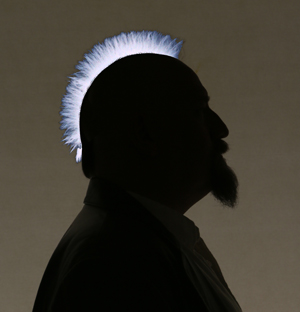A friend and I were sitting in a brewery last weekend, killing time before meeting our wives for dinner. A wide-ranging discussion of pop culture touched on the concept of monsters in fiction, and what we want and expect out of them.
There are as many types of monsters as can be imagined, and as the quote from A Beautiful Mind goes, “man is capable of as much atrocity as he has imagination.” But fictional monsters can be loosely gathered up into two categories: those with a backstory and those without. Think of them as “evil because,” and “evil just because.” Each of these concepts can do the job of terrifying the reader or viewer, as long as it is consistent with the goals and tone of the story being told.
Monsters with no backstory are easy to find. Look no further than John Carpenter’s 1978 masterpiece Halloween or the much more recent instant horror classic It Follows. In Halloween, six-year-old Michael Myers transforms from a seemingly normal child into the brutal murderer of his own sister in the films opening moments, filmed chillingly from first-person perspective. From then on, he never speaks a word and barely moves a muscle until fifteen years later when he breaks out of his mental ward and begins killing again.
The monster of It Follows, despite the film’s slasher sensibilities, isn’t even human. Rather, it’s a malevolent force that kills whomever has been afflicted with it. Spread through sex, the entity follows its victims at the same maddeningly slow pace wherever they flee. If it catches them, it brutally kills them, then begins working its way back down the line of the cursed, seeking next the person who passed the curse to its now-dead victim. Once afflicted, you are never truly safe again, even if you pass the curse along. Only the afflicted can see the entity, which takes the form of random people, sometimes a stranger, sometimes people they know. Whatever helps it get close.
In both these films, our inability to relate to or understand the monster is a large part of what makes them scary. You cannot reason with Michael Myers or It, just as you cannot fathom why they are doing what they are doing. Despite later films’ ill-advised attempts to tie Michael Myers to a pagan, druid ritual involving the holiday that would become Halloween, any attempt to explain this sort of monster to the viewer robs it of some of its power. No attempt at all is made to explain the curse of It Follows, and that is to the film’s benefit. These monsters are forces of nature, and they are frightening specifically because they recall the fear, buried deep in our DNA, of being preyed upon by creatures that would never offer mercy and could never be reasoned with. Creatures that saw us only as food.
For examples of villains with backstories, look no further than George R.R. Martin and Thomas Harris. A Song of Ice and Fire is replete with human monsters of both the “evil because” and “evil just because” variety, but where Martin really excels is establishing the protagonist family of the Starks and setting them against the antagonist family of the Lannisters. Very quickly the reader is led to hate the Lannisters, and at some point in the story each member of that family commits monstrous acts, either against the Starks directly or just in general. But over the course of the series, Martin masterfully peels back his onion layer by layer, and we are shown the inner worlds of the Lannister characters and the reasons (very valid to them) why they do awful things. Tyrion we sympathize with from the beginning of course, but no one was more surprised than I when Martin made me like Jaime Lannister. Even with Cersei I could find a measure of pity if not any warmth. If you delve into The World of Ice and Fire, you can even learn a bit of what Tywin Lannister, the main architect of his children’s misery, endured as a younger man that shaped him into the man he later became.
Few books I’ve ever read chilled me as much as Thomas Harris’ Red Dragon. The first of the Hannibal Lecter books, this features a plot similar to the more well-known Silence of the Lambs, but with a different FBI investigator trying to catch a different serial killer. This killer, Francis Dolarhyde, is a singular creation in fiction. He murders entire families at the behest of an alternate personality he calls the Red Dragon. Much of the book is told from his perspective, and it’s the most effective example of getting into the head of a deeply disturbed individual I’ve ever read. We come to learn that Francis, born with a harelip and a cleft palate, was abandoned by his mother and raised with brutal cruelty by his grandmother. This treatment ended up warping Francis into the monster he becomes, and the reader feels anger, horror and pity all at once for the character.
If done effectively, this kind of monster awakens a very different kind of fear. Rather than worrying what lurks beyond the firelight, waiting to eat us, the “evil because” monster forces us to look inward, to see the monster lying dormant within each of us (and our fellows). We look and we wonder. Everyone has heard the quote “There but for the grace of God go I.” If we were perhaps less strong or even just less fortunate, if the various circumstances of our lives had combined in the perfect (or anti-perfect) way, would we end up as warped as these characters? Just how far beneath our surface does a monster lurk?
Each of these kinds of monsters can be used effectively in your writing. However, care must be taken to avoid combining traits of the “evil because” and “evil just because” monsters into a single character. It accomplishes nothing but to muddy the waters and confuse the reader, dragging them out of any sense of immersion you’ve built. The key, as always, is in figuring out the kind of story you are trying to tell and what tools need to be pulled from your toolbox to perform the work.
Don’t worry, the rest of the monsters will still be there, waiting for you, when this particular story is done…
About the Author: Gregory D. Little
Rocket scientist by day, fantasy and science fiction author by night, Gregory D. Little began his writing career in high school when he and his friend wrote Star Wars fanfic before it was cool, passing a notebook around between (sometimes during) classes. His first novel, Unwilling Souls, will be available later this year. His short fiction can be found in The Colored Lens and the upcoming Game of Horns: A Red Unicorn Anthology. He lives in Virginia with his wife and their yellow lab.

 Evan Braun is an author and editor who has been writing books for the last two decades. He is the author of The Watchers Chronicle, whose third volume, The Law of Radiance, is forthcoming this spring. He specializes in hard science fiction and lives in the vicinity of Winnipeg, Manitoba.
Evan Braun is an author and editor who has been writing books for the last two decades. He is the author of The Watchers Chronicle, whose third volume, The Law of Radiance, is forthcoming this spring. He specializes in hard science fiction and lives in the vicinity of Winnipeg, Manitoba. A while back I had to tell myself to put the keyboard down and step away slowly. As a result, there’s a project I haven’t touched in over a year. What’s worse is that one of the people from a critiquing group back then keeps asking me to finish the damn book.
A while back I had to tell myself to put the keyboard down and step away slowly. As a result, there’s a project I haven’t touched in over a year. What’s worse is that one of the people from a critiquing group back then keeps asking me to finish the damn book.